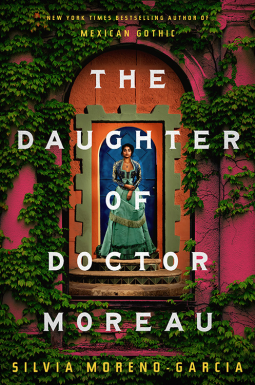The Daughter of Doctor Moreau, by Silvia Moreno-Garcia (Ballantine)
My introduction to the Mexican-centered fantasy of Silvia
Moreno-Garcia was her re-telling of the Cinderella story, Gods of
Jade and Shadow. Now she offers a fresh interpretation of H. G. Wells’s
classic novel, The Island of Doctor Moreau. Instead of retreating to a
hidden island to perform his experiments, this Dr. Moreau seeks the relative
solitude of the Yucatán jungles, on an estate owned by a wealthy man in search
of cheap, malleable plantation laborers. Under the pretense of developing such
workers, Dr. Moreau creates human-animal hybrids from various animals. They
are, alas, less than functional, with rapid aging, joint problems, and other
issues. Only his beautiful, meek, and secretly rebellious daughter, Carlota, is
perfectly human. Dr. Moreau needs a majordomo to run the estate and care for
the infirm hybrids, so he hires Montgomery Laughton, a drifter heavily in debt
and drowning a broken marriage in drink. Isolated and surrounded by lush forest
and fascinating creatures, Montgomery begins to slowly form a friendship with
Carlota and to heal.
When the landowner’s charming and egotistical son arrives at
the estate, he is instantly smitten with Carlota, thereby setting into motion a cataclysmic chain of events.
Like other of Moreno-Garcia’s adventures, The
Daughter of Doctor Moreau is strongly character-driven. Maturation and
healing are the twin lenses that focus the action, which begins slowly in the
near-static serenity of the estate and builds to a breathless climax. At first,
I found Carlota childish, especially her constant verbal sparring with her two
closest hybrid friends. Her flirtation with the landowner’s son struck me as
dangerously naïve. As the story went on, however, I noticed the parallels
between her increasing understanding of the world at large and of herself. Her capacity
for acceptance—of her friends, of her father, of Montgomery with his tortured
past, and of her own true nature—emerges as the moral and emotional center of
the book.

No comments:
Post a Comment